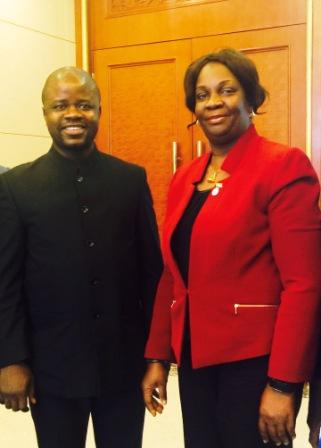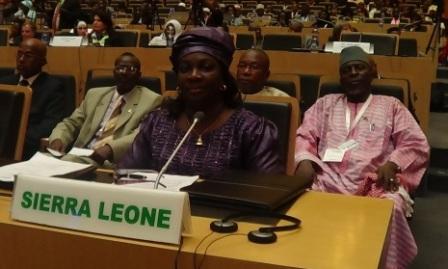Deputy Health Minister Madam Madina Rahman for High Level Global Health Meet in Geneva
Freetown, Nov. 25, 015 (MOHS) – Deputy Health and Sanitation Minister, Madina Rahman alongside six other high level panelists are to participate in a debate covering health related issues in this year’s International Organization for Migration (IOM) conference in Geneva, Switzerland on November 26, 2015. Deputy Health and Sanitation Minister II, Madam Madina Rahman
Held in the World Intellectual Property Organization new conference hall in Geneva, Switzerland on the theme: “Migration, human mobility and global health – a matter for diplomacy and inter-sector partnership”. This year’s session brings together the organization’s 157 member states and 10 observer states as well as many UN agencies and civil society representatives.
Chaired by the Director General IOM, Mr. William Lacy Swing, with the official statement by His Excellency Maithripala Sirisena, President of the Democratic Socialist Republic of Sri Lanka, the six high level panelist world include Deputy Minister of Health II Madina Rahman, the Director General WHO, Dr. Margaret Chan, Director General for Health and Food Safety, European Commission, Mr. Xavier Prats Monne and His Excellency Ambassador Paivi Kairamo, Permanent Representative of the UN Geneva.
This year’s Council session is taking place at a particularly significant time for the topic of international migration. The increasing recurrence of human tragedies involving migrants and displaced persons in many parts of the world reinforces the imperative to take action and to foster international cooperation in order to face the ensuing challenges.
Migration and population mobility and associated risk factors are increasingly being recognized as determinants of health for migrant and host communities. Globalization, speed of travel and a changing security landscape, present new challenges for global health that requires greater attention to health risks associated with migration and population mobility, both within and across national borders. These challenges require innovative, systematic, evidence-based, multi-disciplinary and inter-country responses and partnership.
Migrant health is a complex topic to be looked at from various angles including health security, public health, foreign policy, human rights, social health determinants, human security and the desired achievement of development goals. However, migrant health is not well integrated in the related dialogues and international policy venues. Also, national policies and health systems have not kept pace with the changes and diversification in our societies leaving groups of migrants without adequate social and health services. This is compounded by a number of factors: increasingly restrictive migration policies; anti-migrant sentiments in societies sustained by the economic downturn and xenophobia; discrimination and abuse against migrants; and the still insufficient offer of equitable and targeted health and social services for many categories of migrants. This will ultimately impact public health and socio-economic development. From a Global Health Security perspective, the Ebola virus disease in West Africa is a testimony of the fact that human mobility is a key factor in the spread of pandemics and outbreaks and those migrant sensitive surveillance mechanisms are essential for effective disease control measures.
Significant milestones in recent years include the adoption of the 2008 Resolution on the ‘Health of Migrants’ by the 61st World Health Assembly and the subsequent Global Consultative on ’Migrant the Way Forward’, co-organized by WHO, IOM, and the government of Spain in 2010. Care recommendations called for multi sector partnerships based on system-wide approaches as well as inter-country collaboration. Since then, relevant frameworks and tools have been developed and some governments and agencies made considerable progress. Such initiatives deserve wider visibility and dissemination to ensure the still existing major gaps can be addressed effectively.
Despite this progress, millions of migrants are still denied access to health care and remain invisible to global health initiatives. A number of obstacles remain, such as lack of specific policies or mechanisms to enhance access to Universal Health Coverage for migrants; inadequate data that impedes the monitoring of essential health parameters; lack of sustained advocacy and leadership to make migrants’ voices heard.
Additionally, internal and cross-border human mobility remain poorly understood and addressed within disease surveillance and response mechanisms at country, regional and global levels. Therefore, effective multi-sectoral solutions along the continuum of human mobility – at the point of origin, in transit, at destination and upon return – require the support of inter-country diplomacy and the adoption of pragmatic responses in the best interest of public health of communities at large.
JAK/KK/MOHS/SLENA
Stay with Sierra Express Media, for your trusted place in news!
© 2015, https:. All rights reserved.






